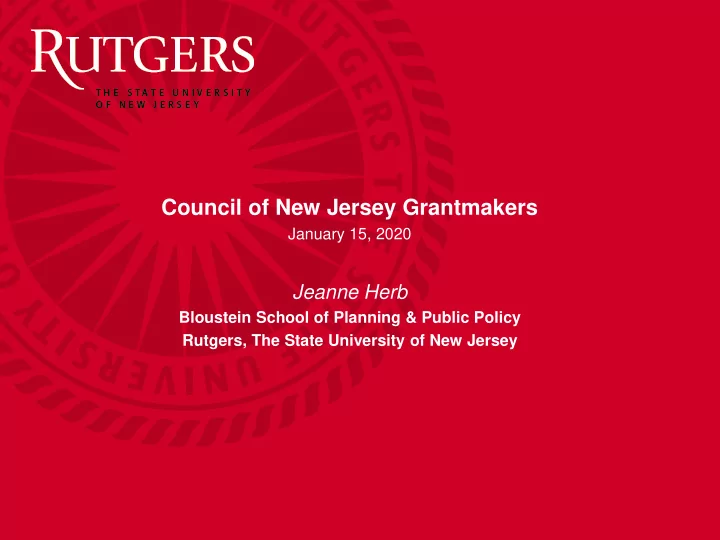

Council of New Jersey Grantmakers January 15, 2020 Jeanne Herb Bloustein School of Planning & Public Policy Rutgers, The State University of New Jersey
Combustion of fossil fuels (coal, petroleum, natural gas) emits carbon dioxide into the atmosphere
3 Source: NJDEP
1. More warm extremes with less cooling intervals 2. Heavy rains become more intense with dry spells becoming more frequent. 3. Rising sea levels will increase storm- related and “sunny day” flooding and intensity of coastal storms will increase.
TEMPERATURE: Trends in global average temperature Source: NASA/Goddard Institute for Space Studies
Trends in annual mean New Jersey temperature • Long-term upward trend of 2.8°F per 100 years • More rapid warming since 1970 • The seven warmest years have occurred since 1998 • The 12 warmest years have occurred since 1990. • 2012 was the warmest year on record Source: National Centers for Environmental Information
Source: National Climate Assessment (2017)
Trends in annual mean New Jersey precipitation • Long-term upward trend of 2.7” per 100 years • Large decadal variability (early 1960s drought, wet 1970s, very wet in 2000s) • Most of the upward trend comes from changes in spring and fall Source: National Centers for Environmental Information
(2070-2099 average) – (1976-2005 average) Source: National Climate Assessment (2017)
New Jersey sea level trends • Century-scale global sea level rise has been 1.7±0.3 mm/yr. • This rate has nearly doubled in the past two decades. • Sea level in New Jersey is rising more rapidly than the global average because land is also subsiding. • Sea level at Atlantic City has risen 17.6 inches since records began in 1911.
New Jersey sea level projections • Projected changes in ocean currents are also expected to add to the rate of sea level rise on the New Jersey coast. • A recent analysis by a Rutgers-led team of scientists projects that by 2030, sea level on the NJ coast will likely rise by 0.5-1.1 feet (relative to 2000), with a central estimate of 0.8 feet. • In 2050, the range is 0.9-2.1 feet with a central estimate of 1.4 feet. • By 2100, the range is 1.7-3.9 feet (best estimate of 2.8 feet) for a lower emissions scenario and 2.3-6.3 feet (best estimate 3.9 feet) for a higher emission scenario. Source: Kopp, R. E. et al., 2019: New Jersey’s Rising Seas and Changing Coastal Storms: Report of the 2019 Science and Technical Advisory Panel.
A few notes on SLR: • After 2050 SLR scenarios are emissions dependent • SLR affects both “sunny day” flooding and flooding from weather events • New Jersey’s “coast” = 239 municipalities 14 Jessica Kourkounis/Getty Images
Cascading Effect of Climate Change in New Jersey 15
Climate Change: An Exacerbator of Root Causes of Health Inequities 16
What we’ve heard 2. 1. In a world of rising inequality, risks and opportunities are not equally shared* 4. 3. Change Assess what we equity measure impacts 6. 5. Community Address Driven root causes Strategies 7. Authentic 8. Mandates engaged processes *Bounce Forward, Island Press/Kresge
Intersecting climate change and health equity goals generates synergistic outcomes that create a society that is not only healthier , more resilient and environmentally sustainable , but a society that is just , in which opportunity is available to all, and risks are equitably shared. 18
New Jersey Perspectives : http://eac.rutgers.edu/wp- content/uploads/Eagleton-NJCCA-NJ- Climate-Poll-report_04-25-19.pdf • 2/3 of New Jerseyans are either “very” or “somewhat” concerned about the effects of climate change on their life, their family members, or people around them. • Less than ¼ know “a lot” about what to do to prepare for climate change. • Government should give people resources to rebuild or relocate: Upper income – 49% Lower & middle income – 63% • How to reduce greenhouse gases: o Government should impose limits on the sources of greenhouse gasses(limiting emissions from cars, trucks, and industries – 27% o Government should try to reduce greenhouse gases voluntarily by offering incentives to those who reduce emissions (residents, businesses, industries – 45% o Both or neither – 20% • Who should pay added cost to make NJ more resilient to climate change? o Fuel producers and responsible users – 62% o State government from current taxes – 43% 19 o Residents – 6%
Resources • New Jersey Climate Change Alliance https://njadapt.rutgers.edu/ • Rutgers Climate Institute https://climatechange.rutgers.edu/ • NJADAPT http://www.njadapt.org/ • New Jersey Floodmapper https://www.njfloodmapper.org/ • New Jersey Forest Adapt https://njforestadapt.rutgers.edu/#/splash 20
Equity and State/city climate policy (13 states, 2 cities) https://www.rggiprojectseries.org/reports Rapid Health Impact Assessment of draft New Jersey Energy Master Plan w/ focus on equity http://eac.rutgers.edu/eac-team-conducts-rapid-hia-on-new-jerseys-draft- energy-master-plan/ New Rutgers report on sea level rise and coastal storm projections for NJ https://climatechange.rutgers.edu/resources/climate-change-and-new- jersey/nj-sea-level-rise-reports A seat at the table: insights from engagement with populations vulnerable to climate change http://eac.rutgers.edu/social-vulnerability-and-climate-change/ Summary:June 24 convening of NJ leaders on climate change/health equity jherb@ejb.rutgers.edu Sea level rise and resilience policies in 15 states outside NJ http://eac.rutgers.edu/rutgers-researchers-study-state-sea-level-rise-policies/ Overlay of race, income and environmental burden in New Jersey http://eac.rutgers.edu/eac-staff-develops-indicators-of-health-inequities-in- new-jersey/ 21
jherb@ejb.rutgers.edu Thank y you 848-932-2725; 908-752-5455 22
Recommend
More recommend